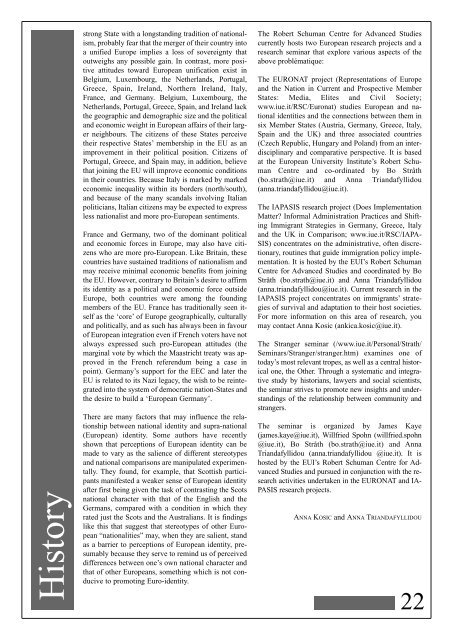History - European University Institute
History - European University Institute
History - European University Institute
Create successful ePaper yourself
Turn your PDF publications into a flip-book with our unique Google optimized e-Paper software.
<strong>History</strong><br />
strong State with a longstanding tradition of nationalism,<br />
probably fear that the merger of their country into<br />
a unified Europe implies a loss of sovereignty that<br />
outweighs any possible gain. In contrast, more positive<br />
attitudes toward <strong>European</strong> unification exist in<br />
Belgium, Luxembourg, the Netherlands, Portugal,<br />
Greece, Spain, Ireland, Northern Ireland, Italy,<br />
France, and Germany. Belgium, Luxembourg, the<br />
Netherlands, Portugal, Greece, Spain, and Ireland lack<br />
the geographic and demographic size and the political<br />
and economic weight in <strong>European</strong> affairs of their larger<br />
neighbours. The citizens of these States perceive<br />
their respective States’ membership in the EU as an<br />
improvement in their political position. Citizens of<br />
Portugal, Greece, and Spain may, in addition, believe<br />
that joining the EU will improve economic conditions<br />
in their countries. Because Italy is marked by marked<br />
economic inequality within its borders (north/south),<br />
and because of the many scandals involving Italian<br />
politicians, Italian citizens may be expected to express<br />
less nationalist and more pro-<strong>European</strong> sentiments.<br />
France and Germany, two of the dominant political<br />
and economic forces in Europe, may also have citizens<br />
who are more pro-<strong>European</strong>. Like Britain, these<br />
countries have sustained traditions of nationalism and<br />
may receive minimal economic benefits from joining<br />
the EU. However, contrary to Britain’s desire to affirm<br />
its identity as a political and economic force outside<br />
Europe, both countries were among the founding<br />
members of the EU. France has traditionally seen itself<br />
as the ‘core’ of Europe geographically, culturally<br />
and politically, and as such has always been in favour<br />
of <strong>European</strong> integration even if French voters have not<br />
always expressed such pro-<strong>European</strong> attitudes (the<br />
marginal vote by which the Maastricht treaty was approved<br />
in the French referendum being a case in<br />
point). Germany’s support for the EEC and later the<br />
EU is related to its Nazi legacy, the wish to be reintegrated<br />
into the system of democratic nation-States and<br />
the desire to build a ‘<strong>European</strong> Germany’.<br />
There are many factors that may influence the relationship<br />
between national identity and supra-national<br />
(<strong>European</strong>) identity. Some authors have recently<br />
shown that perceptions of <strong>European</strong> identity can be<br />
made to vary as the salience of different stereotypes<br />
and national comparisons are manipulated experimentally.<br />
They found, for example, that Scottish participants<br />
manifested a weaker sense of <strong>European</strong> identity<br />
after first being given the task of contrasting the Scots<br />
national character with that of the English and the<br />
Germans, compared with a condition in which they<br />
rated just the Scots and the Australians. It is findings<br />
like this that suggest that stereotypes of other <strong>European</strong><br />
“nationalities” may, when they are salient, stand<br />
as a barrier to perceptions of <strong>European</strong> identity, presumably<br />
because they serve to remind us of perceived<br />
differences between one’s own national character and<br />
that of other <strong>European</strong>s, something which is not conducive<br />
to promoting Euro-identity.<br />
The Robert Schuman Centre for Advanced Studies<br />
currently hosts two <strong>European</strong> research projects and a<br />
research seminar that explore various aspects of the<br />
above problématique:<br />
The EURONAT project (Representations of Europe<br />
and the Nation in Current and Prospective Member<br />
States: Media, Elites and Civil Society;<br />
www.iue.it/RSC/Euronat) studies <strong>European</strong> and national<br />
identities and the connections between them in<br />
six Member States (Austria, Germany, Greece, Italy,<br />
Spain and the UK) and three associated countries<br />
(Czech Republic, Hungary and Poland) from an interdisciplinary<br />
and comparative perspective. It is based<br />
at the <strong>European</strong> <strong>University</strong> <strong>Institute</strong>’s Robert Schuman<br />
Centre and co-ordinated by Bo Stråth<br />
(bo.strath@iue.it) and Anna Triandafyllidou<br />
(anna.triandafyllidou@iue.it).<br />
The IAPASIS research project (Does Implementation<br />
Matter? Informal Administration Practices and Shifting<br />
Immigrant Strategies in Germany, Greece, Italy<br />
and the UK in Comparison; www.iue.it/RSC/IAPA-<br />
SIS) concentrates on the administrative, often discretionary,<br />
routines that guide immigration policy implementation.<br />
It is hosted by the EUI’s Robert Schuman<br />
Centre for Advanced Studies and coordinated by Bo<br />
Stråth (bo.strath@iue.it) and Anna Triandafyllidou<br />
(anna.triandafyllidou@iue.it). Current research in the<br />
IAPASIS project concentrates on immigrants’ strategies<br />
of survival and adaptation to their host societies.<br />
For more information on this area of research, you<br />
may contact Anna Kosic (ankica.kosic@iue.it).<br />
The Stranger seminar (/www.iue.it/Personal/Strath/<br />
Seminars/Stranger/stranger.htm) examines one of<br />
today’s most relevant tropes, as well as a central historical<br />
one, the Other. Through a systematic and integrative<br />
study by historians, lawyers and social scientists,<br />
the seminar strives to promote new insights and understandings<br />
of the relationship between community and<br />
strangers.<br />
The seminar is organized by James Kaye<br />
(james.kaye@iue.it), Willfried Spohn (willfried.spohn<br />
@iue.it), Bo Stråth (bo.strath@iue.it) and Anna<br />
Triandafyllidou (anna.triandafyllidou @iue.it). It is<br />
hosted by the EUI’s Robert Schuman Centre for Advanced<br />
Studies and pursued in conjunction with the research<br />
activities undertaken in the EURONAT and IA-<br />
PASIS research projects.<br />
ANNA KOSIC and ANNA TRIANDAFYLLIDOU<br />
22

















